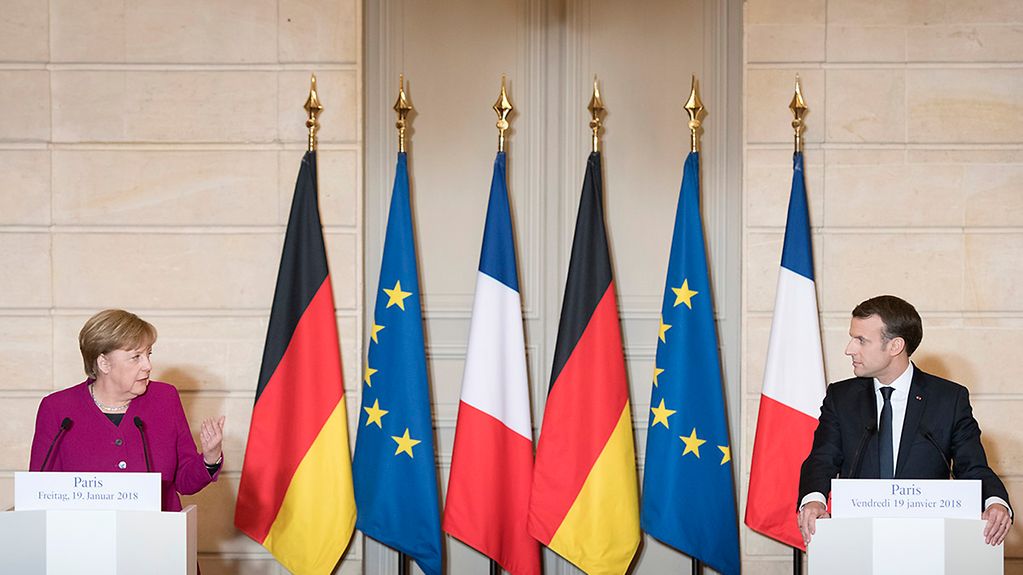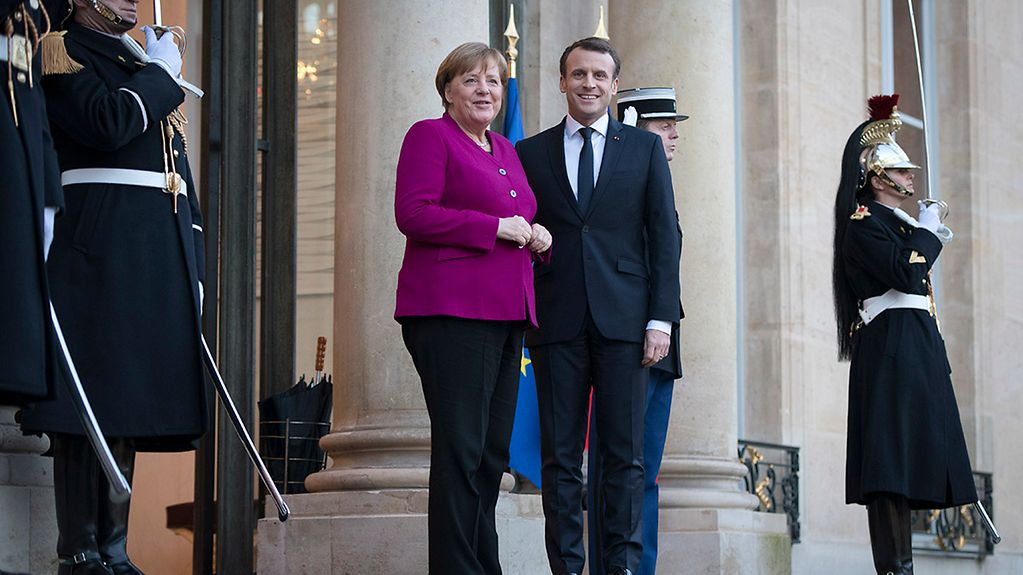Angela Merkel meets with Emmanuel Macron
When it comes to strengthening Europe the Chancellor is focusing her efforts on close cooperation with France. Speaking in Paris, she expressed her delight that the two countries "intend to renew the Elysée Treaty to address the challenges of the 21st century". Monday will mark the 55th anniversary of the signing of the Elysée Treaty.

Angela Merkel and Emmanuel Macron aim to strengthen Europe so it can cope with the challenges of the future
Photo: Bundesregierung/Bergmann
According to the Chancellor, Germany and France are "ready and willing" to take a proactive stance and address the challenges of the 21st century together. To this end they aim to renew the Elysée Treaty, stated Chancellor Angela Merkel unequivocally during her visit to Paris on Friday.
Three days before the 55th anniversary of the signing of the Elysée Treaty, at a press conference with French President Emmanuel Macron, Angela Merkel said, "This Treaty was a brave step. And that is why I am happy that we have taken this decision, and that we will be asking our parliaments to renew the Treaty to address the new challenges of the 21st century."
Putting Europe on a sounder footing in a global world
Angela Merkel pointed to the breadth of bilateral relations between the two countries. In contrast to the position 55 years ago, Franco-German relations today are also always part of moves to strengthen Europe. The question is how to put Europe on a better footing to enable it to address the new challenges posed by our global world. This will also be reflected in the new version of the Elysée Treaty, said the Chancellor with conviction.
Close Franco-German cooperation goes well beyond bilateral matters. It is also apparent in the joint commitment of the two countries in Africa, on climate action, and in questions of strengthening Europe in economic, technological and scientific terms.
We will lead the way together, says Chancellor
"Germany and France can and should lead the way together on many issues," underscored Angela Merkel. She gave the example of developing company tax law. In addition to this, the Chancellor advocates a common European foreign policy on strategic issues. A common development policy should also be drawn up, she added.
Angela Merkel believes that Europe must urgently invest far more rigorously, in digital technology for instance. Commenting on the common monetary policy, Angela Merkel said, "In future the euro zone must be the trailblazer in terms of competitiveness."
"People must always be the focus"

The reason for their meeting was the 55th anniversary of the signing of the Elysée Treaty on Monday
Photo: Bundesregierung/Bergmann
In the evening Angela Merkel and Emmanuel Macron intended to visit a recital in Paris given by the pianist Daniel Barenboim to mark the start of the Debussy Year. This too is symbolic, said Angela Merkel. Barenboim spent many years in Paris and now conducts the Staatskapelle in Berlin.
"He is essentially a global citizen," said the Chancellor. He has experienced all the dimensions of Franco-German cooperation but also the global alignment of culture. "This should be a reminder to us never to work only for ourselves as politicians, but always to remember that it is all about people, the full spectrum of human relations," declared Angela Merkel.
A treaty of friendship that continues to this day
On Monday Germany and France will celebrate the 55th anniversary of the signing of the Elysée Treaty. Parliamentarians from the two countries will first attend a session in the German Bundestag. In the evening there will then be a joint session in the Assemblée Nationale, the lower chamber of the French parliament. Chancellor Angela Merkel will be attending the session in the German Bundestag.
On 22 January 1963, French President Charles de Gaulle and Chancellor Konrad Adenauer signed a treaty on Franco-German cooperation at the Elysée Palace. The Elysée Treaty, as it became known, enshrined the wish of both nations for lasting partnership and cooperation. It provides for far-reaching cooperation on political, economic and cultural issues.
The background to the Treaty was the realisation on both sides that a unified and peaceful Europe would only be possible if France and Germany cooperated more closely.
The Treaty has three core provisions:
- A mandatory consultation mechanism between the President and the Chancellor, and their ministers and leading civil servants,
- A commitment to consult on all important aspects of foreign, European and defence policy, and if possible to achieve a common position,
- A commitment to work together on education and youth so as to build a bridge between the two countries for the future.
Working together for tomorrow’s EU
Tomorrow morning the Chancellor will fly from Paris to Sofia, to meet with Bulgarian Prime Minister Boyko Borisov. With him she will discuss primarily Bulgaria’s Presidency of the Council of the European Union.
Bulgaria took over the rotating Presidency for the first time on 1 January. The country joined the European Union in 2007. The motto of its Presidency is "United we stand strong". The Presidency of the Council of the European Union rotates among member states every six months.